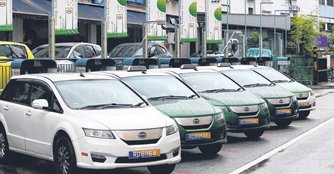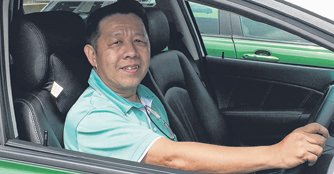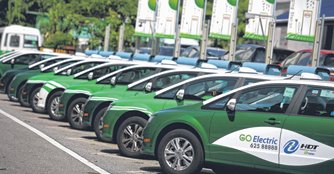New taxi operator all-electric HDT upbeat despite losses
11 Aug 2018|2,800 views
An all-electric taxi firm secured a full 10-year licence to become Singapore's latest taxi operator earlier this month, despite incurring losses for the past few years.

But HDT Singapore Holding, HDTT's parent company, has been making losses since it was started in 2014, according to the latest publicly available data on BizFile. The company lost $926,603 in the financial year ending 31st January, 2017, down from the $1.14 million loss for the previous financial year.
For the financial year ending 31st January, 2017 , HDTT lost $273,191.
Asked what factors it had considered in assessing HDTT's business viability, the LTA named factors such as the soundness of its business proposal, company organisational structure, past performance records, as well as projected business and financial capabilities. "How its business performs will depend not only on its capabilities but those of its competitors and prevailing market conditions," added an LTA spokesman.
It was earlier reported that HDTT aims to grow its fleet to 800 by 2022, adding about 200 taxis to its fleet each year. As a full-fledged taxi operator, HDTT will no longer enjoy tax exemption for its fleet - its 100 taxis were not taxed when they were operating as research vehicles during a two-year trial.

Mr. Ng told The Straits Times that the company's business has turned around since the third quarter of last year, though he declined to give further details.
"Financially and operationally, we are viable," he said, noting that taxis still have the edge over private-hire cars in that they can pick up street-hail passengers.
HDTT's expansion of its charging infrastructure to cater to its growing fleet could also be a source of revenue, he said. Within the next four years, there will be about 320 charging stations - or one charging station to every 21.5 taxis - to meet the needs of its growing fleet. The firm is considering opening these stations to others who wish to charge their electric vehicles for a fee, said Mr. Ng, though he added that no companies have expressed interest so far.
The firm hopes to diversify its offerings and is looking into providing specialised transportation services, include transporting pets or the elderly to and from medical appointments and eldercare services. HDT is already partnering with ride-hailing firm Grab for the GrabShuttle shuttle bus service. HDT is looking to expand its shuttle bus services, and aims to expand its electric bus fleet to 10 by the first quarter of next year. "We are talking to hotels, tourist attractions and hospitals to provide green vehicles," said Mr. Ng.

BYD - which is backed by billionaire Warren Buffett's investment firm Berkshire Hathaway - is the world's largest electric vehicle manufacturer. It sold more than 110,000 electric vehicles last year, making a profit of more than four billion yuan ($800 million) during that period.
Nanyang Business School Adjunct Associate Professor Zafar Momin said that as HDT has not been around for long, it is difficult to say how viable their business model is in the long term. But he said it may be more difficult for electric vehicle fleets to take off here than in China, where such vehicles get extensive Government subsidies to promote their use.
Mr. Ng said that for now, HDTT is focused on recruiting more drivers who, as employees, can be promoted to management positions. He hopes that this will appeal to those who are looking for career prospects. "Not all want to be drivers forever," he said.
An all-electric taxi firm secured a full 10-year licence to become Singapore's latest taxi operator earlier this month, despite incurring losses for the past few years.

But HDT Singapore Holding, HDTT's parent company, has been making losses since it was started in 2014, according to the latest publicly available data on BizFile. The company lost $926,603 in the financial year ending 31st January, 2017, down from the $1.14 million loss for the previous financial year.
For the financial year ending 31st January, 2017 , HDTT lost $273,191.
Asked what factors it had considered in assessing HDTT's business viability, the LTA named factors such as the soundness of its business proposal, company organisational structure, past performance records, as well as projected business and financial capabilities. "How its business performs will depend not only on its capabilities but those of its competitors and prevailing market conditions," added an LTA spokesman.
It was earlier reported that HDTT aims to grow its fleet to 800 by 2022, adding about 200 taxis to its fleet each year. As a full-fledged taxi operator, HDTT will no longer enjoy tax exemption for its fleet - its 100 taxis were not taxed when they were operating as research vehicles during a two-year trial.

Mr. Ng told The Straits Times that the company's business has turned around since the third quarter of last year, though he declined to give further details.
"Financially and operationally, we are viable," he said, noting that taxis still have the edge over private-hire cars in that they can pick up street-hail passengers.
HDTT's expansion of its charging infrastructure to cater to its growing fleet could also be a source of revenue, he said. Within the next four years, there will be about 320 charging stations - or one charging station to every 21.5 taxis - to meet the needs of its growing fleet. The firm is considering opening these stations to others who wish to charge their electric vehicles for a fee, said Mr. Ng, though he added that no companies have expressed interest so far.
The firm hopes to diversify its offerings and is looking into providing specialised transportation services, include transporting pets or the elderly to and from medical appointments and eldercare services. HDT is already partnering with ride-hailing firm Grab for the GrabShuttle shuttle bus service. HDT is looking to expand its shuttle bus services, and aims to expand its electric bus fleet to 10 by the first quarter of next year. "We are talking to hotels, tourist attractions and hospitals to provide green vehicles," said Mr. Ng.

BYD - which is backed by billionaire Warren Buffett's investment firm Berkshire Hathaway - is the world's largest electric vehicle manufacturer. It sold more than 110,000 electric vehicles last year, making a profit of more than four billion yuan ($800 million) during that period.
Nanyang Business School Adjunct Associate Professor Zafar Momin said that as HDT has not been around for long, it is difficult to say how viable their business model is in the long term. But he said it may be more difficult for electric vehicle fleets to take off here than in China, where such vehicles get extensive Government subsidies to promote their use.
Mr. Ng said that for now, HDTT is focused on recruiting more drivers who, as employees, can be promoted to management positions. He hopes that this will appeal to those who are looking for career prospects. "Not all want to be drivers forever," he said.
Latest COE Prices
August 2025 | 2nd BIDDING
NEXT TENDER: 03 Sep 2025
CAT A$104,524
CAT B$124,400
CAT C$72,190
CAT E$125,001
View Full Results Thank You For Your Subscription.




















